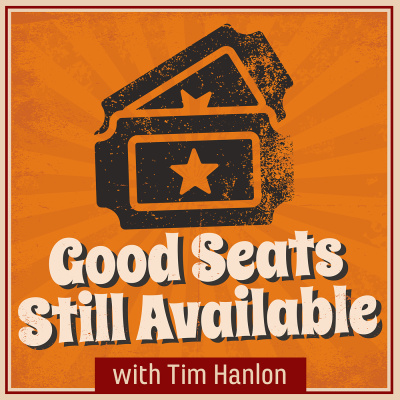Synopsis
Good Seats Still Available is a curious little podcast devoted to the exploration of what used-to-be in professional sports. Each week, host Tim Hanlon interviews former players, owners, broadcasters, beat reporters, and surprisingly famous "super fans" of teams and leagues that have come and gone - in an attempt tounearth some of the most wild and woolly moments in (often forgotten) sports history.
Episodes
-
091: NASL Soccer Video Archeology – With Dave Brett Wasser
10/12/2018 Duration: 01h14minThe images are grainy, the commentary earnestly naïve, and the theme music disco-infused, but the bigger picture is clear – it’s American soccer history, in all its VHS videotape glory. Gleaned from a simpler, pre-HD media landscape of the 1970s and early 1980s – much of it before even the mass consumer adoption of the VCR – the roughly 900 hours of TV broadcast match coverage that still survives from the pioneering North American Soccer League is a veritable time machine of pro soccer’s coming-of-age. And one man has been chiefly responsible for compiling and preserving it. De facto soccer video anthropologist Dave Brett Wasser has spent over two decades tracking down virtually every known snippet of NASL game footage – more than 450 league and exhibition matches in all – for what is arguably the most comprehensive collection of vintage soccer Americana anywhere. Meticulously (and sometimes just plain luckily) sourced from a myriad of former players, coaches, TV network vaults, and even garage sales – Wass
-
090: The National Football League’s Origin (and Survival) Story – With John Eisenberg
03/12/2018 Duration: 01h26minAuthor John Eisenberg (Ten-Gallon War: The NFL’s Cowboys, the AFL’s Texans, and the Feud for Dallas’s Pro Football Future) returns, this time to guide us through the fascinating formative years of the National Football League – and the five now-legendary figures responsible for nurturing its development through tumultuous times and an often-uncertain future into what is now America’s most popular sport. In his new book The League: How Five Rivals Created the NFL and Launched a Sports Empire, Eisenberg highlights the individual dedication and collective conviction of Pittsburgh’s Art Rooney, Chicago’s George Halas, New York’s Tim Mara, Washington’s George Preston Marshall, and Philadelphia’s Bert Bell to risk everything in building and growing the game of professional football. Originally formed (as the “American Professional Football Association”) at a time (1920) when the sport barely registered on the national scene (baseball, boxing, horse racing, and even the college version of the game all rated higher i
-
089: The NBA Buffalo Braves – With Tim Wendel
26/11/2018 Duration: 01h32minThe Buffalo Braves were one of three NBA expansion franchises (along with the Portland Trail Blazers and Cleveland Cavaliers) that began play in the 1970–71 season. Originally owned by a wobbly investment firm with few ties to Buffalo, the Braves eventually found a local backer in Freezer Queen founder Paul Snyder – who, by the end of the first season, had inherited a team that was neither good (penultimate league records of 22-60 in each of its first two seasons), nor easy to schedule (third-choice dates for Buffalo’s venerable Memorial Auditorium behind the also-new NHL hockey Buffalo Sabres, and Canisius Golden Griffins college basketball). Snyder addressed the Braves’ on-court issues by luring head coach Dr. Jack Ramsey from the Philadelphia 76ers, while drafting key players like high-scoring (and later Naismith Basketball Hall-of-Famer) Bob McAdoo, eventual NBA Rookie of the Year Ernie DiGregorio, and local (via Buffalo State) crowd favorite Randy Smith – yielding three consecutive playoff appearances f
-
088: The 1968-69 AFL New York Jets – With Bob Lederer
19/11/2018 Duration: 01h52minOn January 12, 1969, the American Football League champion New York Jets stunned the sports world when they beat their heavily favored NFL title-winning counterparts the Baltimore Colts to win the third annual “AFL–NFL World Championship Game” – today remembered as version III of the “Super Bowl.” The key to the Jets’ ultimate success, of course, was superstar quarterback Joe Namath – whose talent, confidence and charm had already made him an instant celebrity when he first arrived on the Gotham sports scene in 1965. But the rise of the former (and by the end of its third season in 1962, insolvent) New York Titans to the top of the pro football heap was far from a solo effort. Author Bob Lederer (Beyond Broadway Joe: The Super Bowl Team That Changed Football) joins host Tim Hanlon to discuss the decade-long saga of the Jets’ remarkable evolution from a mediocre team in a dilapidated stadium in an oft-derided "Mickey Mouse" league, to a franchise that literally saved the AFL from itself and vaulted a newly me
-
087: New York’s Shea Stadium’s Curious 1975 – With Brett Topel
12/11/2018 Duration: 01h17minIt was, unwittingly, the center of the New York professional sports universe in 1975. The official home of both Major League Baseball’s Mets and AFL-then-NFL football’s Jets since 1964, Shea Stadium was always a busy venue. But when the football Giants and baseball Yankees found themselves displaced by extensive renovations to their shared Bronx home of Yankee Stadium, Shea instantly became Mecca for Gotham sports fans – hosting all four teams over the course of their respective 1975 seasons. The Giants, of course, had already started their wayward journey away from the Bronx in 1973, when plans were announced for a brand new, state-of-the art facility in the Meadowlands of East Rutherford, New Jersey to open in time for Big Blue’s 1976 season. After two miserable seasons at New Haven, Connecticut’s Yale Bowl (winning only one of 12 games there), the Giants were wooed by New York mayor Abe Beame to play one last season back inside the city limits before absconding for good across the Hudson. The Yankees, m
-
086: The Battle for Dallas: The AFL Texans vs. The NFL Cowboys – With John Eisenberg
05/11/2018 Duration: 01h26minBy the end of the 1958 NFL season – one punctuated by an iconic, nationally televised “Greatest Game Ever Played” championship – interest in professional football had risen to unprecedented levels across the country, capturing enough attention to seriously challenge baseball for America’s chief sporting interest. Nowhere was the ground more fertile than in the state of Texas, where college and even high school football had held sway for generations – but the pro game (last attempted with a relocated 1952 NFL franchise called the Texans that ended in mid-season abandonment) had still yet to firmly root. But in the spring of 1960, after an unlikely series of events, two young oil tycoons each became convinced of the opportunity to start their own pro franchises in Dallas’ legendary Cotton Bowl: a reincarnated club called the “Texans” – part of a new upstart circuit called the American Football League; and a hastily arranged response from the established (and newly threatened) NFL called the “Cowboys.” Virtual
-
085: Houston’s Iconic Astrodome – With Bob Trumpbour
29/10/2018 Duration: 01h39minWhen it debuted to the public on April 9, 1965 (with an exhibition Major League Baseball game featuring the newly-renamed Houston Astros and Mickey Mantle’s New York Yankees), the Astrodome – audaciously dubbed the “Eighth Wonder of the World” by its builders – immediately captured the attention of the sports, entertainment and architectural worlds. It was a Texas-sized vision of the future – a seemingly unimaginable feat of engineering, replete with breakthrough innovations such as premium luxury suites, theater-style seating, and the world’s first-ever animated stadium scoreboard. At the time, it was the biggest-ever indoor space ever made by man – an immense cylinder nearly half-a-mile around and with a flying-saucer-like roofline – that evoked a modern space age that the city of Houston and a reach-the-Moon-obsessed nation envisioned for itself. Amidst the ambition, not all was perfect: baseball outfielders were initially unable to see fly balls through the stadium’s clear Plexiglas roof panels, and at
-
084: The 1960s-Era NFL Baltimore Colts – With Jack Gilden
22/10/2018 Duration: 01h36minThe third incarnation of the Baltimore Colts – the second as an official member of the NFL – produced some of the most memorable and dominant teams to ever play the pro game. Winners of impressive back-to-back NFL titles over the New York Giants in both 1958 (the December 28th Yankee Stadium sudden-death overtime final regarded as the mythic “Greatest Game Ever Played”) and 1959, the Colts and head coach Weeb Ewbank surprisingly stumbled into mid-table mediocrity in the early years of the 1960s – enough to convince mercurial owner Carroll Rosenblum to make a stunning change at the end of the team’s (7-7) 1962 season – one that would quickly shake up the squad and the expectations behind it. The selection of Detroit Lions defensive coordinator Don Shula to become the new head coach of the Colts was eyebrow-raising for a number of reasons – age (at 33, the youngest-ever to be chosen for such a role in the NFL up until that time); relative inexperience (only two years as a college assistant at Virginia and Kent
-
083: The Baltimore Orioles, Boston Beaneaters & the 1897 NL Pennant Race – With Bill Felber
15/10/2018 Duration: 01h23minCareer journalist and baseball history author Bill Felber (A Game of Brawl: The Orioles, the Beaneaters, and the Battle for the 1897 Pennant) joins the big show to discuss the most cut-throat pennant race in American baseball history – a multi-level study in contrast that also symbolically set the course of how the modern-day game would ultimately be played. On one side was the original incarnation of the Baltimore Orioles – a charter member of the 1882 American Association who migrated to the National League ten years later (and not genealogically connected to today’s current American League club). Led by eventual baseball Hall of Famers John McGraw, Wee Willie Keeler, and managerial innovator “Foxy” Ned Hanlon (no relation to your humble host?), the original O’s had a reputation as the dirtiest team in baseball – though many of the tactics they employed (e.g., tight pitching, base-stealing, hit-and-run plays, and precise bunting) were simply edgy approaches to the rules that later became strategic staples
-
082: AFL & NFL Football All-Star Ron McDole
08/10/2018 Duration: 01h31minIn a nearly 20-year playing career across the 1960s American Football League and 1970s NFL, defensive end Ron McDole (The Dancing Bear: My Eighteen Years in the Trenches of the AFL and NFL) experienced pro football’s modern-day coming-of-age from inside his old-school, two-bar helmet. From 1961-1978, McDole played in over 250 professional games, including championship runs with the AFL Buffalo Bills (1964, 1965) and a Super Bowl appearance with the NFL Washington Redskins in 1972. A cagey and deceptively agile athlete, McDole wreaked havoc on football’s best offenses as part of a Bills defensive line (including left tackle Jim Dunaway, right tackle Tom Sestak, and right end Tom Day) that held opponents without a rushing touchdown for 17 straight games across 1964-65. His twelve career interceptions remain a pro record for defensive linemen. Traded by the Bills in 1970, he was given new life in Washington as one of the most famous members of George Allen s game-smart veterans known as the “Over the Hill Gang.
-
081: Roller Hockey International – With Richard Neil Graham
01/10/2018 Duration: 01h21minRichard Neil Graham (Wheelers, Dealers, Pucks & Bucks: A Rocking History of Roller Hockey International) joins the big show to delve into the 1990s summertime indoor league started by inveterate sports entrepreneur (and defunct sports patron saint) Dennis Murphy – designed to profit from major arena owners’ desire for summer events, minor league players looking for extra work, and a budding national craze for inline skating. Despite deep pockets from several team and arena owners from the NBA and NHL – including Los Angeles’ Buss family (previous Murphy partners in World Team Tennis two decades earlier), and Howard Baldwin (an original franchise owner in the Murphy-founded World Hockey Association in 1972) – the bulk of RHI franchises were decidedly less capitalized or marketing-savvy. That didn’t stop the league from aggressive expansion, however, from an inaugural 1993 roster of 12 teams to a mind-boggling 24 franchises the following season (and diligent listeners to this podcast know how ambitious
-
080: The AAFC, AFL & the NFL’s Formative 1950s – With Economist David Surdam
24/09/2018 Duration: 01h39minAfter barely surviving World War II, the National Football League of the late 1940s was not only on tenuous financial footing, but also facing an existential threat from an ambitious new challenger with deep-pocketed owners ready take advantage of America’s growing interest in professional football, a newfound surplus of playing talent, and a tantalizing return to economic prosperity. While the All-America Football Conference lasted for only four seasons (1946-49), its mere presence jolted the historically conservative and inwardly-focused NFL into an era of dramatic transformation and strategic maturation that laid the groundwork for a meteoric rise in popularity for the sport and secured its position against the raft of competitive challenges to its supremacy in the decades that followed. University of Northern Iowa Professor of Economics and David W. Wilson Business Ethics Fellow David Surdam (Run to Glory and Profits: The Economic Rise of the NFL During the 1950s) joins host Tim Hanlon to discuss the eco
-
079: The NHL’s New York/Brooklyn Americans – With Dale Morrisey
17/09/2018 Duration: 01h36minOn September 21, 2013, a crowd of 14,689 Brooklyn hockey fans cheered when the NHL’s New York Islanders played a pre-season exhibition against the New Jersey Devils in the sleekly modern Barclays Center – the first-ever contest of its kind in New York’s most populous borough, and one that set into motion the eventual relocation of the team from Long Island to Kings County. What few in the stands realized, however, was that the borough, technically, was the home to a professional hockey team many decades earlier. Originally funded from a Depression-era bootlegger’s fortune, the New York (later renamed Brooklyn) Americans pre-dated the NHL’s long-running and legendary New York Rangers by a year, and were the star attraction of the third incarnation of Madison Square Garden during its debut in 1925. Featuring brightly colored, red-white-and-blue, star-spangled uniforms, and a roster of largely Canadian players from the recently league-expelled Hamilton (ON) Tigers, the “Amerks” were the immediate toast of the
-
078: The United States Football League – With Jeff Pearlman
10/09/2018 Duration: 01h20minMultiple New York Times bestselling sports book author Jeff Pearlman (Gunslinger; Boys Will Be Boys; The Bad Guys Won!; Sweetness) joins the pod this week to promote his latest literary treasure – a deeply personal devotional about the wild and ultimately misbegotten United States Football League. Crafted from over four hundred interviews and borne of a childhood fascination/obsession, Football For a Buck: The Crazy Rise and Crazier Demise of the USFL is a narrative tour de force that chronicles the bizarre and often comical story of the erstwhile early 1980s spring league that pugnaciously challenged the pro football establishment with a witches’ brew of ownership bravado, expensive player talent, national TV coverage, wayward franchises, bounced paychecks – and, audaciously, a Hail Mary of a class action federal lawsuit that won the battle, but ultimately lost the war against the supremacy of the NFL. Thanks to MyBookie, OldSchoolShirts.com, Audible, and SportsHistoryCollectibles.com for sponsoring this w
-
077: Before the NHL’s “Original Six” – With Andrew Ross
03/09/2018 Duration: 01h18minWhen quizzed on the historical origins of the National Hockey League, most fans reflexively default to the hagiographic construct known as the “Original Six” – the Boston Bruins, Chicago Blackhawks, New York Rangers, Montreal Canadiens, Toronto Maple Leafs, and Detroit Red Wings – as the seminal franchise lineup from which the modern-day NHL was ultimately built. In fact, the league traces its official roots to a much friskier start dating back to 1917 – when, out of the ownership discord of the predecessor National Hockey Association (1909-17), and a rising challenge to Stanley Cup supremacy from other fledgling pro circuits like the Pacific Coast Hockey Association and Western Canada Hockey League – a then-four team (and all-Canadian) NHL made its debut with franchises in Toronto (Arenas), Ottawa (Senators), and Montreal (Canadiens and Wanderers). Over the next 25 years, the league fitfully expanded and contracted across cities like St. Louis, Quebec, Hamilton, Boston, Pittsburgh, Philadelphia, Chicago, Det
-
076: National Soccer Hall of Fame Coach Gordon Jago
27/08/2018 Duration: 01h38minWe continue our march towards the upcoming 50th anniversary reunion of the North American Soccer League (as part the rechristening of the National Soccer Hall of Fame in Frisco, TX on October 19-21, 2018), with one of the coaching pioneers from the league’s heyday, Gordon Jago (A Soccer Pioneer: The Autobiography of Gordon Jago). After a sparkling youth career with England’s Charlton Athletic and the national Under-20s, Jago quickly segued to coaching in the mid-1960s as an assistant coach with First Division Fulham – where he, during a summer exhibition in Oakland, CA, became smitten with the idea of professional soccer in the US. Persuaded by eventual NASL co-founder (and Episode #74 guest) Clive Toye, Jago jumped the pond in to become head coach of the newly consolidated league’s 1968 Baltimore Bays, whose beer baron/owner Jerold Hoffberger soon gave up on the team, the league and the sport by the following season. After a brief stint overseeing the US National team later that year for World Cup ’70
-
075: The World Hockey Association Hall of Fame with Tim Gassen
20/08/2018 Duration: 01h24minBuckle up for our sophomore excursion into the legendary World Hockey Association, as we chat with the passionate founder and meticulous curator of the short-lived but influential league’s official Hall of Fame, Tim Gassen. Physically ensconced inside the United States Hockey Hall of Fame in Eveleth, MN, as well as an expansive online digital presence, the WHA Hall of Fame is the undisputed historical authority on the brief seven-season life and wild times of the iconic 1970s-era challenger league that kicked the staid National Hockey League in the butt and reinvigorated the pro game in the process. Gassen joins host Tim Hanlon to discuss the: Origins of his WHA fanaticism (sparked by childhood memories of Indianapolis Racers games); Wayward (and illustrative) journeys of teams like the Jersey Knights (née New York Raiders/Golden Blades, then San Diego Mariners) and the Calgary Cowboys (birthed as the Miami Screaming Eagles, converted into the Blazers of Philadelphia, then of Vancouver, before saddling up a
-
074: NASL Soccer's Chief Architect Clive Toye
13/08/2018 Duration: 01h45minFamed Soccer America columnist Paul Gardner summed up this week's Hall of Fame guest in his May 2015 commentary: “The debt owed by American soccer to Clive Toye is a vast one. It is not too much of an exaggeration to say, flatly, that without Toye’s blind faith in the sport in the 1970s, pro soccer in the USA would have withered and died. Yes, Phil Woosnam and Lamar Hunt and Bob Hermann were there too. But in those unpromising years it was Toye’s voice -- it came in a steady flow of ridiculously optimistic press releases and grandiose plans for a future that few others even dared to ponder -- that called loudest. “The New York Cosmos general manager credited with turning that league’s fortunes around when he signed Pele to a contract in 1975. Toye, who was born in England and came to the United States in 1967 at the age of 33, was president of three North American Soccer League teams – the Cosmos, Chicago Sting and Toronto Blizzard – and general manager of the [original National Professional Soccer League and
-
073: The Union Association’s Wilmington Quicksteps – with Jon Springer
06/08/2018 Duration: 01h35minProfessional baseball was barely into its adolescence in 1884 when a hard-playing, hard-drinking minor league club out of tiny Wilmington, Delaware―the Quicksteps―got the opportunity of a lifetime. Led by prototypical early era stars like loud-voiced outfielder/team captain Tommy “Oyster” Burns (aka the “Wilmington Growler,” who sold shellfish in the off-season), and Canadian-born curveball pioneer Edward “The Only” Nolan (who was briefly blacklisted from the National League for lying about missing a game to attend a funeral when he was, instead, out drinking) – the Quicksteps attacked opponents with a spike-sharpened, rough-and-tumble style befitting the major league style of the era. Managed by a cricket-playing New Yorker and bankrolled by a cigar-chewing sporting goods dealer who ran illicit gambling rings by night, the Quicksteps were the talk of the town and the East Coast baseball establishment – accruing an .800 winning percentage in the minors and holding their own (and occasionally winning) in exhib
-
072: Baseball’s “Miracle” Boston Braves with Historian Charlie Alexander
30/07/2018 Duration: 01h19minWhen you’re the oldest continuously operating franchise in baseball (or in all of American professional sports, for that matter), you’re bound to have some stories – and the proverbial dusty boxes of history sitting in the attic of the Atlanta Braves’ SunTrust Park are certainly full of them. This week, we rope in noted baseball historian Charlie Alexander (The Miracle Braves, 1914-1916) to delve into one of the more interesting and oft-forgotten periods of Braves baseball history, when the then-Boston version of the franchise shocked the baseball establishment by rising from last place in the National League on July 4, 1914 to win the league pennant by an astonishing 10 ½ games by regular season’s end (going 68-17 over their final 87 games – a winning percentage of .782), and then sweeping the heavily favored Connie Mack-managed Philadelphia A’s four games to none in the 1914 World Series. Although also uncharacteristically competitive in the next two seasons (finishing second in 1915 and third in 1916), th
































